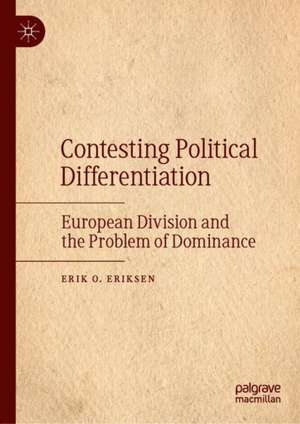Contesting Political Differentiation: European Division and the Problem of Dominance
Autor Erik O. Eriksenen Limba Engleză Hardback – 25 feb 2019
Preț: 501.89 lei
Preț vechi: 590.46 lei
-15% Nou
Puncte Express: 753
Preț estimativ în valută:
96.03€ • 100.54$ • 79.46£
96.03€ • 100.54$ • 79.46£
Carte tipărită la comandă
Livrare economică 07-21 aprilie
Preluare comenzi: 021 569.72.76
Specificații
ISBN-13: 9783030116972
ISBN-10: 3030116972
Pagini: 252
Ilustrații: X, 271 p. 2 illus.
Dimensiuni: 148 x 210 mm
Greutate: 0.49 kg
Ediția:1st ed. 2019
Editura: Springer International Publishing
Colecția Palgrave Macmillan
Locul publicării:Cham, Switzerland
ISBN-10: 3030116972
Pagini: 252
Ilustrații: X, 271 p. 2 illus.
Dimensiuni: 148 x 210 mm
Greutate: 0.49 kg
Ediția:1st ed. 2019
Editura: Springer International Publishing
Colecția Palgrave Macmillan
Locul publicării:Cham, Switzerland
Cuprins
1 Introduction – The predicaments of differentiation.- 2 Autonomy versus arbitrary rule.- Part I: A politically differentiated Europe.- 3 Dimensions of political differentiation in Europe.- 4 Dominance through segmentation.- 5 Hegemony through self-inflicted subservience.- 6 Contested multilateral dominance.- Part II: Overcoming illicit divergence.- 7 Constituting power in Europe.- 8 Structural injustice and the paradigm of solidarity.- 9 Differentiation as a vehicle of integration.- 10 Conclusion.
Notă biografică
Erik O. Eriksen is Professor of Political Science and Director of ARENA – Centre for European Studies at the University of Oslo, Norway. His main research fields are political theory, democratic governance, public policy and European integration. His publications include the following books: The Normativity of the European Union (2014) and The European Union’s Non-Members: Independence under Hegemony (co-edited with John Erik Fossum, 2015).
Textul de pe ultima copertă
This book discusses the causes and nature of political differentiation in Europe. It deals with the normative problem of differentiated integration, both in its vertical and horizontal dimensions, and addresses the problem of differentiation through a theory of democratic autonomy and dominance. A politically differentiated EU could deprive people of their right to co-determine common affairs and have adverse effects for democratic self-rule. It could also take away the people’s ability to influence political decisions that they are ultimately affected by. This book argues that differentiation is not an innocent instrument for handling conflicts in interconnected contexts. The consequences of what might be a benign plea for sovereignty and independence can in fact lead to the opposite.
Erik O. Eriksen is Professor of Political Science and Director of ARENA – Centre for European Studies at the University of Oslo, Norway. His main research fields are political theory, democratic governance, public policy and European integration. His publications include the following books: The Normativity of the European Union (2014) and The European Union’s Non-Members: Independence under Hegemony (co-edited with John Erik Fossum, 2015).
Erik O. Eriksen is Professor of Political Science and Director of ARENA – Centre for European Studies at the University of Oslo, Norway. His main research fields are political theory, democratic governance, public policy and European integration. His publications include the following books: The Normativity of the European Union (2014) and The European Union’s Non-Members: Independence under Hegemony (co-edited with John Erik Fossum, 2015).
Caracteristici
Argues that segmentation is the systemic effect of differentiation in the vertical dimension of integration Deals with ways to overcome harmful political differentiation Devises a new analytical framework for differentiation
